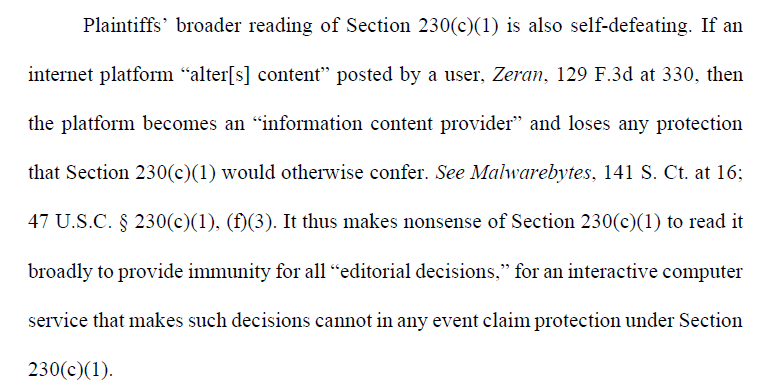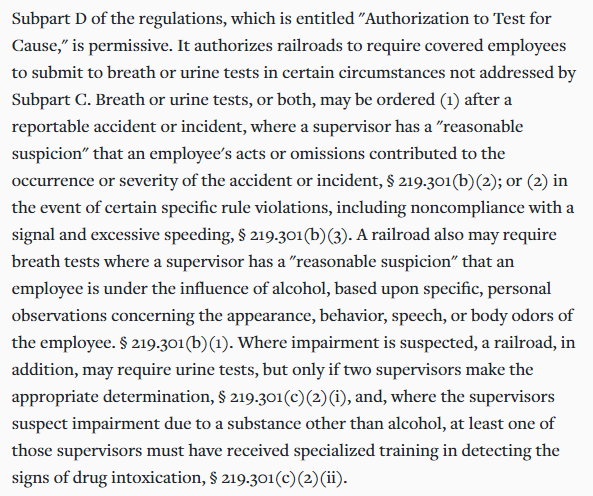
1/ Florida filed its brief opposing the motion for a preliminary injunction against the state's new social media law.
I have thoughts. In this part I'll talk about what they got wrong about #Section230. In a second part, the First Amendment argument.

I have thoughts. In this part I'll talk about what they got wrong about #Section230. In a second part, the First Amendment argument.
https://twitter.com/TechFreedom/status/1403426213389950976

2/ The brief: courtlistener.com/docket/5994220…
Florida desperately wants to change the conversation to #Section230 instead of the First Amendment, because that's the conversation they've always wanted this to be about; it's the political hot button they want to feverishly mash.
Florida desperately wants to change the conversation to #Section230 instead of the First Amendment, because that's the conversation they've always wanted this to be about; it's the political hot button they want to feverishly mash.
3/ So they frontloaded the 230 discussion.
But they get off to a bad start by claiming that 230 was prompted only by the Stratton Oakmont, which held Prodigy liable for user content because it engaged in *some* content moderation.
But they get off to a bad start by claiming that 230 was prompted only by the Stratton Oakmont, which held Prodigy liable for user content because it engaged in *some* content moderation.
4/ But as many do, they omit the *other* case that 230 was aimed at: Cubby Inc. v. Compuserve: casetext.com/case/cubby-inc…
5/ Under Cubby, websites could be liable if they knew or should have known about the nature of the content in question, which provided a heavy incentive to not monitor or moderate at all.
6/ That's important because Florida is arguing Congress didn't intend to preempt laws regulating how content moderation decisions are made. But the entire *point* of Section 230 was to remove disincentives for websites to make these decisions for themselves, even imperfectly.
7/ Subjecting platforms to government regulation and enforcement of "consistency" places them right back in the moderator's dilemma: moderate at all, and you'll find plenty of people alleging that it's done inconsistently (because it's *impossible* to *do* consistently)
8/ So better, then, to just not moderate at all (which is exactly what they want) rather than risk reprisal from state regulators over their subjective feelings about your consistency and fairness. That's *exactly* what Congress *didn't* want.
9/ Florida argues that 230(c)(1) is inapplicable because it only applies to decisions to leave up content, not those to take down content. But that's wrong, and their citation to a footnote in a case that wasn't decided on 230 grounds doesn't even support the stated proposition. 

10/ That footnote in Almeida, which again, the 11th Circuit decided did not need to reach the 230 question, said that most courts have held that (c)(1) protects against liability for refraining to moderate. Not that it's "at most" what (c)(1) does. casetext.com/case/almeida-v… 

11/ To be sure, saying "some courts" is a clever way to try to minimize "damn near all of them." But that's not going to fool the court. At the end of the day, 230(c)(1) applies to the editorial discretion to post or remove content. 

12/ The brief goes off on what amounts to a verbatim recital of Justice Thomas's "without the benefit of briefing" statement on the denial of cert in Malwarebytes, repeating all of the same, factually and legally incorrect arguments that have been refuted ad nauseum. 



13/ Florida also argues that even if 230(c)(1) was relevant (and it is), SB 7072 is consistent with the provision because it doesn't mandate certain content standards, it just regulates *how* they are enforced. 

14/ But that's nothing more than obfuscation. The "how" here *is* effectively the content standards. To make content moderation decisions, platforms necessarily have to subjectively analyze content, and make the call about what is allowed--and those criteria don't line up 1-to-1.
15/ After going on for many pages under the incorrect belief that 230(c)(2)(A) is the correct focus, Florida tries the old "230 only protects against damages, not injunctive relief" chestnut to avoid preemption. That too, is wrong. 

16/ Injunctions requiring platforms to undo their content moderation decisions are not just mildly inconsistent with Section 230—they eviscerate its core purpose of removing obstacles that would discourage websites from developing and enforcing content rules.
17/ Ok so I lied: there will be *some* First Amendment discussion in this part, because Florida argues that Section 230 might itself be unconstitutional. 

18/ Plaintiffs will no doubt say they are private actors not bound by the First Amendment, because it is true. But Section 230 doesn't create platforms' ability to "censor however they like." They have a First Amendment right to do that (as will be discussed in Part 2) 

19/ Skinner v. Railway Labor might seem applicable at first blush, but a closer read reveals that it doesn't actually support Florida's argument that Section 230 makes social media platforms state actors. Let's take a look: casetext.com/case/skinner-v…
20/ Skinner involved a challenge to federal regulations that, in part, allowed railroads to perform breath or urine tests on employees in certain circumstances. 

21/ Florida cites the "removed all legal barriers" language to draw an analogy to Section 230.
And indeed, the regulations preempted all state laws that would impair such testing. But those regs also did much more than Florida wants to tell you.
And indeed, the regulations preempted all state laws that would impair such testing. But those regs also did much more than Florida wants to tell you.
22/ They preempted collective bargaining, gave the government access to samples and test results, barred a railroad from divesting itself of the granted authority (as "inconsistent with its duty to promote the public safety"), and mandated removal of those who refused testing.
23/ That high level of government coercion and rather explicit indications that railroads should be testing (and would be answerable to regulators should they not and an accident occur) is why the Supreme Court found state action. 

24/ In contrast, Section 230 has none of the coerciveness that the FRA regulations had. Section 230 does not mandate or even strongly recommend *any* content moderation, let alone specific results. It merely facilitate websites' ability to make the decision for themselves.
25/ The Court's subsequent "permissive law" jurisprudence makes clear that Florida's argument fails.
26/ In American Manufacturers, the Court rejected claims that a law allowing insurers to withhold workers comp payments for review (where previously prohibited) created state action.
27/ The Court held that creating a permissive law wasn't sufficient "encouragement" to make the insurers' decisions state action--they were simply given the option which they were free to take or not at their discretion. casetext.com/case/american-… 



28/ So too with Section 230: websites have the option to moderate content and to decide how to do so, at their discretion, and the govt has decided to step out of that argument and not provide a legal remedy. There is simply no government coercion whatsoever. 

29/ And just this past January, the Northern District of California rejected Florida's exact argument, noting that Section 230 doesn't require anything of anyone, or give the government any stake whatsoever. casetext.com/case/divino-gr…? 

30/ Surely, as I've said before, if the government actively leaned on a platform to remove certain speech, there could be a plausible argument that the moderation constituted state action. But the argument that Section 230's broad application creates state action is not credible
31/ Perhaps sensing that argument's weakness, Florida rips off a Volokh article (really all its arguments here are rather unoriginal, pulled from various op-eds and musings) and cites to Railway Employees' Dept. v. Hanson: casetext.com/case/railway-e…?
32/ Hanson found state action in a union agreement, authorized permissively by Congress, preempting contrary state law, because while the agreement was between private parties, the law was "the source of the power and authority by which any private rights are lost or sacrificed." 

33/ I think that argument is unconvincing for two reasons. First, the Hanson Court said that the union shop agreements necessarily bore the imprimatur of federal law. I think that argument is less compelling when dealing with something more abstract like content moderation. 

34/ Second, and more concretely, is the matter of "the source...by which private rights are lost or sacrificed."
35/ If content moderation is protected by the First Amendment (and it is), the "private rights" that Florida claims Section 230 provides the power to curtail are not its to dole out, and Hanson is inapt.
36/ And that, friends, is why this is *really* all about the First Amendment, which I'll discuss in Part 2.
• • •
Missing some Tweet in this thread? You can try to
force a refresh









